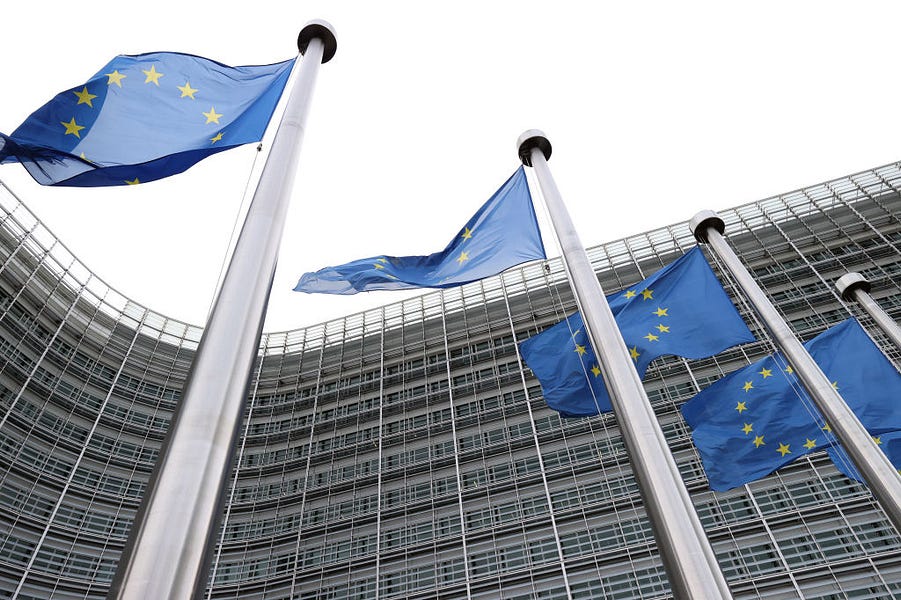This week, the European Union’s leaders discussed a draft plan for the “Rapid Deployment Capacity,” a 5,000-strong EU military force, to be used by the bloc in crisis situations from 2025 onward.
The proposal, set for final approval in March, appears to be another step in the direction of what France’s President Emmanuel Macron likes to call Europe’s “strategic autonomy.” Back in 2008 the Lisbon Treaty led to the creation of the European External Action Service, the EU’s diplomatic and foreign affairs body, alongside the position of a high representative for foreign affairs and security policy—the EU’s foreign minister.
The calls for such autonomy are not new. Donald Trump regularly called on Europeans to “pay their share.” Similarly, Germany’s departing Chancellor Angela Merkel has urged Europeans to take “[their] fate into [their] own hands.” Even the Biden administration’s key strategic decisions—the AUKUS deal or the unilateral withdrawal from Afghanistan, for example—underscore that the United States will not care about Europe’s interests more than Europeans themselves.
The efforts to give Europe a strong voice on the global stage have long suffered from the quintessentially European problem of elevating form and process over substance, and the latest proposal is no exception.
Worse yet, the period in which the EU has been supposedly strengthening its common foreign and security policy has coincided with a dramatic destabilization of the EU’s immediate neighborhood—and the EU’s blunders and inaction have played a significant role.
From northeast to its south, the EU is surrounded by a belt of instability. On the Polish and Lithuanian border, Belarusian and Russian dictators are waging a hybrid war against the bloc with impunity, stoking tensions by flooding the borders with migrants. In the Balkans, Bosnia seems at risk of disintegrating, while Serbia—a candidate for EU membership—is forging ever-deeper ties with Russia. Another putative member-in-waiting, Turkey, has slipped into full-fledged authoritarianism while holding the bloc hostage with its sizable population of refugees. In North Africa, Libya remains a failed state and a source of instability and migration flows. Even Tunisia, until recently a success story of the Arab Spring, has taken a turn for the worse.
There are two reasons for this failure. First, there is a widely acknowledged lack of capacity, resulting from decades of underinvestment in Europe’s militaries. Increased military capabilities and the willingness to use them would help shape such political solutions to fit Europe’s interests—something at which the EU has done a less than adequate job.
Needless to say, only a handful of European countries meet NATO’s 2 percent guideline for defense spending—a metric that has been long mocked by the leading party in Germany’s emerging coalition.
There is, furthermore, a deeper problem with the idea that Europeans can face their geopolitical challenges as one: namely, their widely different views of the nature and salience of such challenges. For Eastern Europeans and the Nordic countries, Russia remains an existential threat; for Germany and France it is just another great power to make deals with. As the fallout from the AUKUS deal illustrates, France happens to have a keen interest in the Indo-Pacific, which is unlikely to be shared by other European countries. Meanwhile, the EU’s officialdom has no idea of what the EU’s view of China should be, painfully triangulating between “partnership,” “rivalry,” and “competition.”
These and other European disagreements are not problems to be solved. They are a condition that the EU has to live with. Different countries have different perceptions of their interests and security concerns, and that imposes a stringent constraint of how much the EU countries will ever do jointly, as a bloc. There were good reasons why the early proposal for a European Defence Community, outlined in the 1951 Treaty of Paris, was dead in the water. Seventy years later, with a much more diverse membership base, the notion that national foreign ministers will take a back seat to EU High Representative Josep Borrell or that member states will cede control over their militaries to Brussels is crazy talk.
That does not mean that the theoretical European fighting force is a squarely bad idea. It does mean, however, that it will likely be deployed only in rare situations of quasi-universal consensus across member states and thus mostly irrelevant to the types of crises that Europeans are likely to continue to encounter over the coming years.
More importantly, Europe’s security is and will remain a primarily national and intergovernmental affair. To believe that Brussels could act as a substitute for the transatlantic partnership or for informal, ad hoc ties between like-minded nations—of the sort that compelled the U.K. government to provide support, albeit symbolic, to Polish efforts to secure its border and to express its commitment to Ukraine’s territorial integrity—is to fall victim to a highly pernicious illusion.
Dalibor Rohac is a senior fellow at the American Enterprise Institute in Washington DC. Twitter: @DaliborRohac.








Please note that we at The Dispatch hold ourselves, our work, and our commenters to a higher standard than other places on the internet. We welcome comments that foster genuine debate or discussion—including comments critical of us or our work—but responses that include ad hominem attacks on fellow Dispatch members or are intended to stoke fear and anger may be moderated.
You are currently using a limited time guest pass and do not have access to commenting. Consider subscribing to join the conversation.
With your membership, you only have the ability to comment on The Morning Dispatch articles. Consider upgrading to join the conversation everywhere.